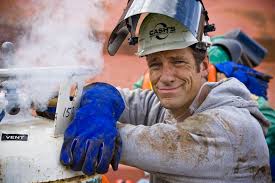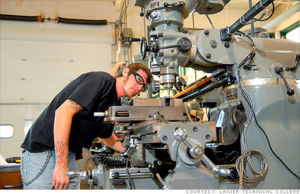Kierkegaard, Nietzsche and the Updated Soulcraft of Motorcycle Maintenance
 Mike Rowe is the impressive guy you may have seen in Ford commercials, but of more pertinent note, as the host of the Discovery Channel’s “Dirty Jobs” and CNN’s “Somebody’s Gotta Do It.” Speaking out passionately across the country on behalf of the trades – and playing off what Marco Rubio said in a presidential debate eons ago now about how we need fewer philosophers but more welders – Rowe has said things such as, “We need balance. We can have both a welder who can quote Kierkegaard and Nietzsche and a philosopher who can weld.”
Mike Rowe is the impressive guy you may have seen in Ford commercials, but of more pertinent note, as the host of the Discovery Channel’s “Dirty Jobs” and CNN’s “Somebody’s Gotta Do It.” Speaking out passionately across the country on behalf of the trades – and playing off what Marco Rubio said in a presidential debate eons ago now about how we need fewer philosophers but more welders – Rowe has said things such as, “We need balance. We can have both a welder who can quote Kierkegaard and Nietzsche and a philosopher who can weld.”
Philosophically speaking, Aristotle or Sartre (I forget which one) called this a “reach,” though an exquisitely noble one. More practically, Rowe’s educating and evangelizing efforts coincide with American Experiment’s soon-to-be-officially announced initiative, “Overlooked Educational Routes to Great Careers: A Multi-Year Project to Help Minnesotans Win In-Demand Jobs Without a Four-Year Degree.”
Likewise fitting perfectly with the project is the work of Matthew Crawford, an idiosyncratically fascinating chap who also is doing invaluable work espousing the value of all kinds of work. Some number of you surely remember his 2009 bestseller, Shop Class as Soulcraft: An Inquiry into The Value of Work. You’re among the lucky ones if you’ve read it, too.
Crawford is a motorcycle mechanic who owns his own shop in Richmond, Virginia. The ritzy word ‘inquiry” in the subtitle is apt, as he holds a Ph.D. in political philosophy from the University of Chicago and worked for a spell in a Washington think tank.
One might be tempted to say something like, “not only is Crawford very good with his hands, but he’s great upstairs as well.” But not only would that be in ugly taste, it also would run 180-degrees counter to the core of his argument, which is that working with one’s hands is quite frequently more cognitively/intellectually/creatively demanding (take your pick) than working behind a desk.
The following excerpts from Shop Class as Soulcraft are longish, suggesting I’m trying to get off easily by robustly quoting somebody else rather than churning out new words of my own. But Crawford’s points so interesting, and he writes so well, my weekend will start both earlier and guilt free.
Presumed partitions between “thinking” and “doing,” Crawford argues, are not new, with the dichotomy of “white collar” versus “blue collar” corresponding to “mental” versus “manual.” These categories “inform the educational landscape even now,” and they entail “two big errors.” First, the neat division assumes that all blue-collar work is routinely “mindless,” and second, that “white-collar work is still recognizably mental in character.” Educators, he writes, who are intent on steering students to “cognitively rich work” might better do so by “rehabilitating the manual trades, based on a firmer grip of what such work is really like.”
This would take some bravery, Crawford realizes, as “Any high school principal who doesn’t claim as his goal ‘one hundred percent college attendance’ is likely to be accused of harboring ‘low expectations’ and run out of town by indignant parents. This indignation is hard to stand against, since it carries all the moral weight of egalitarianism. Yet it is also snobbish, since it evidently regards the trades as something ‘low.’” But the best type of “democratic education,” he contends, “is neither snobbish nor egalitarian.” Instead, “it accords a place of honor in our common life to whatever is best.”
Which leads Crawford to urge public recognition of a “a yeoman aristocracy”; men and women who “gain real knowledge of real things, the sort we all depend on every day.”
More specifically, what does the good doctor from the distinguished Committee on Social Thought at the U of C mean by the “cognitive” demands of working with and fixing “real things” (emphasis mine)? Here is an example that ends painfully.
Early in his career of fixing motorcycles, he had a shop mate who also was a visual artist; a man with an ability to “literally see things that escaped” him. As for his own talents and traits, Crawford acknowledged having the “conceit of being an empiricist,” albeit one who recognized that “seeing things is not always a simple matter.” He went on:
“Even on the relatively primitive vintage bikes that were our specialty, some diagnostic situations contain so many variables, and symptoms can be so under-determining of causes, that explicit analytical reasoning comes up short. What is required then is the kind of judgment that arises only from experience; hunches rather than rules.”
Or more to the hurtful point teased a moment ago, Crawford quickly came to realize that “there was more thinking going on in the bike shop than in my previous job at the think tank.”
Mitch Pearlstein is Founder of American Experiment and Project Director of the Center’s new multi-year initiative, “Overlooked Educational Routes to Great Careers.”